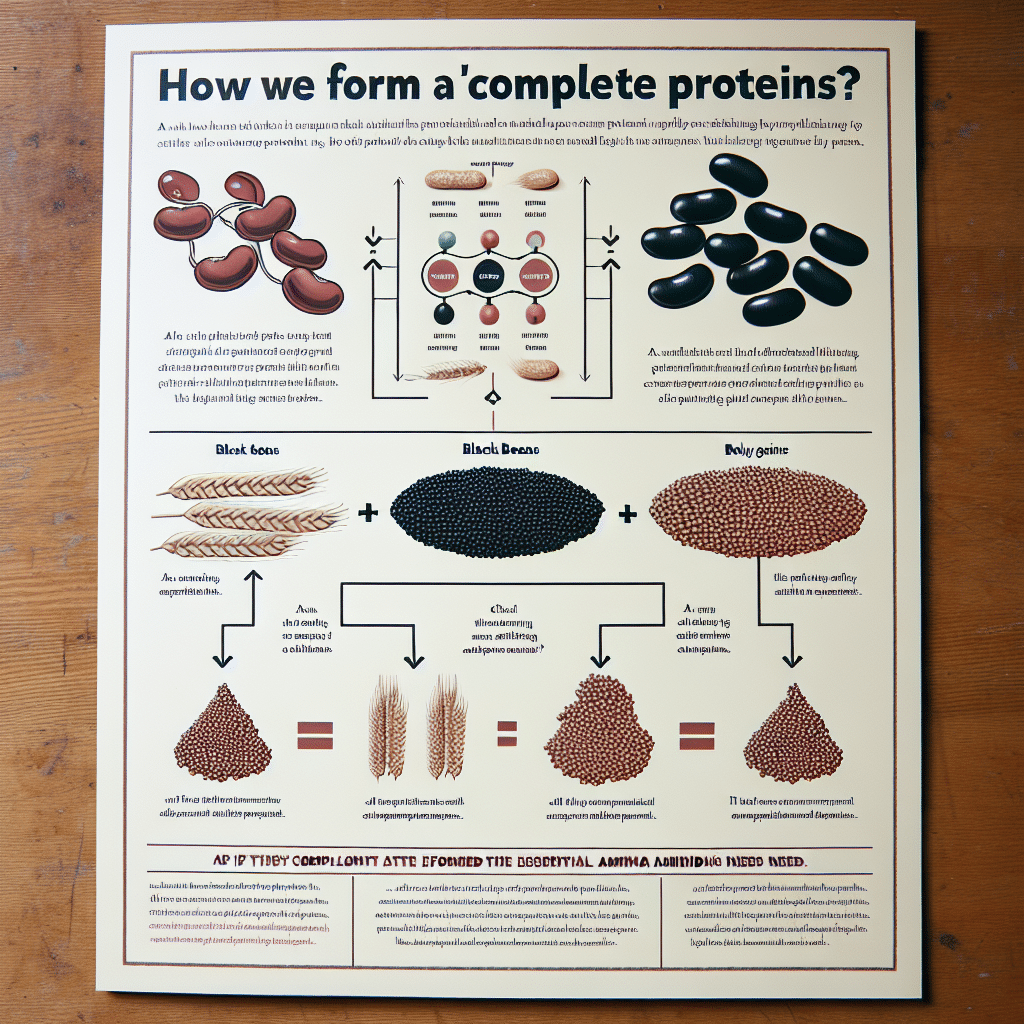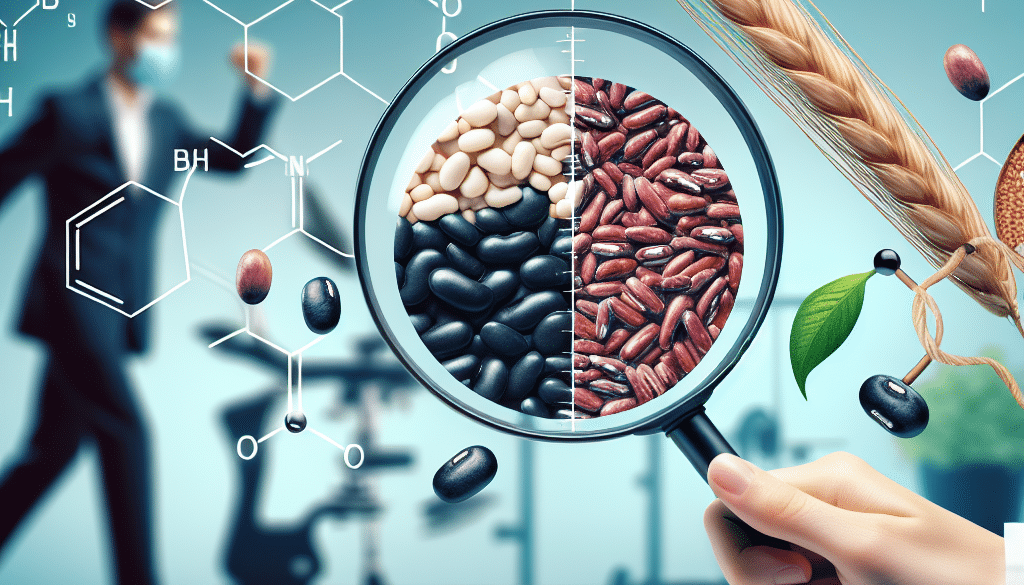Do Black Beans And Barley Make A Complete Protein?
-
Table of Contents
- Black Beans and Barley: Do They Form a Complete Protein?
- Understanding Complete Proteins
- The Nutritional Profile of Black Beans
- The Nutritional Profile of Barley
- Combining Black Beans and Barley for Complete Protein
- Benefits of Plant-Based Complete Proteins
- Practical Considerations for Protein Complementation
- Conclusion: The Synergy of Black Beans and Barley
- Discover ETprotein’s High-Quality Protein Products
Black Beans and Barley: Do They Form a Complete Protein?

Protein is a crucial macronutrient that plays a vital role in building and repairing tissues, making enzymes and hormones, and supporting overall health. A complete protein contains all nine essential amino acids that the human body cannot produce on its own. These amino acids must be obtained through diet. For vegetarians, vegans, and those looking to reduce their meat consumption, finding plant-based sources of complete protein is essential. This article explores whether a combination of black beans and barley can provide a complete protein, offering a nutritious alternative to animal-based proteins.
Understanding Complete Proteins
Proteins are made up of amino acids, which are often referred to as the building blocks of life. There are 20 different amino acids, and a complete protein is one that contains an adequate proportion of all nine essential amino acids. These include histidine, isoleucine, leucine, lysine, methionine, phenylalanine, threonine, tryptophan, and valine.
Animal-based foods like meat, dairy, and eggs typically contain all nine essential amino acids in sufficient amounts, making them complete proteins. However, most plant-based proteins are deficient in one or more essential amino acids, making them incomplete proteins. The key to a balanced vegetarian or vegan diet is to combine different plant-based foods that complement each other’s amino acid profiles.
The Nutritional Profile of Black Beans
Black beans are a staple in many cuisines around the world and are known for their high protein and fiber content. They are also rich in several important nutrients, including iron, potassium, and magnesium. However, like many legumes, black beans are low in the essential amino acid methionine.
- Protein content: Black beans provide about 15 grams of protein per cup (cooked).
- Amino acid profile: While rich in lysine, black beans are not a complete protein on their own due to their low methionine content.
The Nutritional Profile of Barley
Barley is a whole grain that is often overlooked in favor of more popular grains like wheat or rice. It is a good source of dietary fiber, vitamins, and minerals such as manganese, selenium, and phosphorus. Barley also contains protein, but it is low in the essential amino acid lysine.
- Protein content: Barley provides about 3.5 grams of protein per half-cup serving (cooked).
- Amino acid profile: Barley’s protein is incomplete due to its low lysine content.
Combining Black Beans and Barley for Complete Protein
When black beans and barley are consumed together, they can complement each other’s amino acid deficiencies. The lysine in black beans makes up for the shortfall in barley, and the methionine in barley addresses the deficiency in black beans. This combination can create a meal that provides all nine essential amino acids, forming a complete protein.
- Complementary proteins: The concept of combining plant-based foods to create a complete protein is known as protein complementation.
- Meal ideas: A dish combining black beans and barley, such as a hearty soup or a bean salad with barley, can be a nutritious option for those seeking complete plant-based proteins.
Benefits of Plant-Based Complete Proteins
Opting for plant-based complete proteins like the black beans and barley combination has several benefits:
- Environmental impact: Plant-based diets are generally more sustainable and have a lower environmental footprint compared to diets high in animal protein.
- Health benefits: Diets rich in plant-based foods are associated with a lower risk of chronic diseases such as heart disease, diabetes, and certain cancers.
- Economic advantages: Plant-based proteins can be more cost-effective than animal proteins, making them accessible to a wider range of people.
Practical Considerations for Protein Complementation
While the concept of protein complementation is important, recent research suggests that it is not necessary to consume complementary proteins in the same meal. As long as a variety of plant-based proteins are consumed throughout the day, the body can pool the necessary amino acids to form complete proteins.
- Dietary variety: Including a wide range of plant-based proteins in your diet ensures that you get all the essential amino acids over time.
- Meal planning: Focus on overall dietary patterns rather than stressing about combining proteins at every meal.
Conclusion: The Synergy of Black Beans and Barley
In conclusion, black beans and barley can indeed make a complete protein when consumed together. This combination is a powerful example of how plant-based foods can be strategically paired to meet nutritional needs. By incorporating a variety of complementary proteins into your diet, you can enjoy the health and environmental benefits of a plant-based lifestyle without compromising on essential nutrients.
Discover ETprotein’s High-Quality Protein Products
If you’re looking for additional plant-based protein sources, consider exploring ETprotein’s range of organic vegan proteins. ETprotein offers a variety of high-quality protein powders, including organic rice protein, pea protein, and more, that can help you meet your dietary protein requirements. Their products are non-GMO, allergen-free, and come with a neutral taste, making them an excellent addition to any diet.
Whether you’re formulating new health and wellness products or simply looking to enhance your personal nutrition, ETprotein’s offerings can provide the protein solutions you need. Contact them today to learn more about their products and how they can support your protein needs.
About ETprotein:
ETprotein, a reputable protein and L-(+)-Ergothioneine (EGT) Chinese factory manufacturer and supplier, is renowned for producing, stocking, exporting, and delivering the highest quality organic bulk vegan proteins and L-(+)-Ergothioneine. They include Organic rice protein, clear rice protein, pea protein, clear pea protein, watermelon seed protein, pumpkin seed protein, sunflower seed protein, mung bean protein, peanut protein, and L-(+)-Ergothioneine EGT Pharmaceutical grade, L-(+)-Ergothioneine EGT food grade, L-(+)-Ergothioneine EGT cosmetic grade, L-(+)-Ergothioneine EGT reference grade and L-(+)-Ergothioneine EGT standard. Their offerings, characterized by a neutral taste, non-GMO, allergen-free attributes, with L-(+)-Ergothioneine purity over 98%, 99%, cater to a diverse range of industries. They serve nutraceutical, pharmaceutical, cosmeceutical, veterinary, as well as food and beverage finished product distributors, traders, and manufacturers across Europe, USA, Canada, Australia, Thailand, Japan, Korea, Brazil, and Chile, among others.
ETprotein specialization includes exporting and delivering tailor-made protein powder and finished nutritional supplements. Their extensive product range covers sectors like Food and Beverage, Sports Nutrition, Weight Management, Dietary Supplements, Health and Wellness Products, and Infant Formula, ensuring comprehensive solutions to meet all your protein needs.
As a trusted company by leading global food and beverage brands and Fortune 500 companies, ETprotein reinforces China’s reputation in the global arena. For more information or to sample their products, please contact them and email sales(at)ETprotein.com today.












